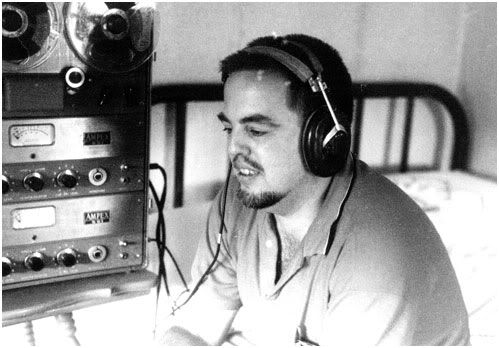
I teach college English. When I take roll, I like to make my students answer a question, instead of just saying "Here." The other day, I asked them, "Who is your favorite musical artist?" Their answers depressed me a little--generally my students gave a sampling of the pop stars of today: Lady Gaga, Bruno Mars, Jason Mraz, Alicia Keyes--artists whose songs are played over and over on the Top 40 radio stations. When I finished roll, one student asked me, "Who is your favorite artist?"
"Alan Lomax," I answered.
I could tell by their blank stares that none of them had heard of Alan Lomax, so I explained, "He made lots of field recordings of folk and blues singers. He would take his tape recorder to prisons and work camps in the South and record the inmates and workers."
No reaction.
"He discovered Leadbelly."
No reaction.
"He was cool," I said, and moved on to my English lesson.
I recount this episode not to belitte or make fun of my students, but rather to illustrate a larger point about music culture in America. Unfortunately, in a consumer culture like contemporary America, the dominant cultural forces are corporations, and they determine and dominate the musical landscape. Record companies and radio stations spend huge amounts of money to saturate the market with their products. Hence the enormous popularity of Lady Gaga, Bruno Mars, Ke$ha, etc.
Alan Lomax, a champion of folk music in the 20th century, saw this trend as far back as 1960. He wrote, "What was once an ancient tropical garden of immense color and variety is in danger of being replaced by a comfortable but sterile and sleep-inducing system" (HiFi Stereo Review, May 1960).
To combat this trend, and to preserve the diversity and uniqueness of folk music in America, Alan Lomax devoted his life to recording, cataloging, and promoting folk and blues artists--particularly those wighout the means to share their art with a larger audience--poor blacks, whites, prisoners, and laborers. He wandered around the South from the 1930s-1960s, toting a variety of recording machines, and capturing the music and stories of these little-known artists.
Alan Lomax was instrumental in establishing the Library of Congress Archive of American Folk Music, and his efforts helped inspire the folk music revival in the 1960s--artists like Pete Seeger, Bob Dylan, and Joan Baez.
Many of the artists Lomax recorded, particularly the blues artists and prisoners, often used their music to criticize the unjust political and social systems under which they lived. Lomax recalled recording a worker on a Texas sharecropper plantation in the 1930s. His name was Blue, and he sang:
Poor farmer, poor farmer
They get all the farmer makes
His clothes is full of patches, his hat is full of holes,
Stoopin' down, pickin' cotton, from off the bottom bolls,
Poor farmer, poor farmer . . .
Lomax wrote of this experience, "The song was a rhymed indictment of the sharecropping system...the plantation folk had put their sentiments on record."
Thus, Lomax's project not only captured the raw beauty of folk and blues music, but it also gave voice to the voiceless. For example, when Lomax discovered the blues singer Leadbelly, he was serving a life sentence in the Louisiana Penn. Lomax recorded Leadbelly singing a pardon appeal ballad. He gave it to his father John Lomax, who gave it to the governor of Louisiana, and Leadbelly was pardoned within six months.
Lomax also helped found the Center for Cultural Equity, which works to preserve the art and music of indigenous cultures around the world.
If Alan Lomax had not had the passion and courage to record and give voice to poor blues and folk singers, our world would be the poorer. His life and work inspires me to ignore the noise machines of corporate music, and instead to seek out music that is raw, honest, and relevant art. If it were not for Alan Lomax, I might never have heard Woody Guthrie, one of my favorite musicians and perhaps my favorite person in American history. Alan Lomax was a total badass, who showed us that you don't need a million dollar recording studio to be a successful musician. All you need is a tape recorder, open ears, and an open heart.
